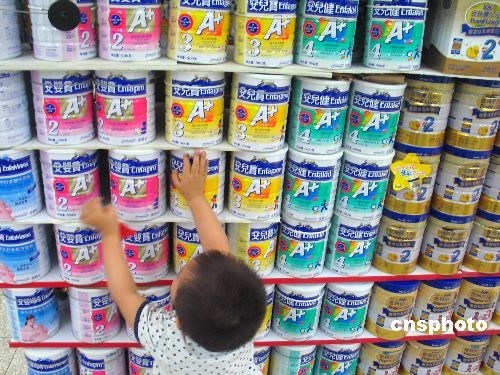
(Ecns.cn) -- Despite bans and high fines, people continue to smuggle baby formula out of Hong Kong into the mainland.
Hong Kong customs officials arrested 87 people in just five days after an emergency two-can limit on exports of milk formula came into force on March 1.
The topic of infant formula continues to linger in headlines, and was also much discussed during this year's annual political sessions. The cause of the problem is now well established: a series of mainland food scandals in recent years has crippled consumer trust, most notably in the dairy industry.
Wang Dingmian, chairman of the Guangdong Provincial Dairy Association, has said that he feels ashamed to be a part of China's dairy industry.
No faith
With baby formula among the products most prone to contamination, worried parents in the Chinese mainland are buying more milk powder from Hong Kong and foreign countries.
Chinese have bought such large quantities of milk from countries like Germany, New Zealand, Australia and Holland, that some supermarkets have set limits on the amount that can be purchased.
American chains Target and Wal-Mart have also banned customers from purchasing more than five to twelve cans of infant formula.
For Chinese mainlanders, the issue runs deep. Zhou Bohua, director of the State Administration for Industry and Commerce, nearly broke down in tears when discussing the fact that consumer confidence has been so tragically undone by something as simple as a tin of milk powder.
As much as 70 percent of citizens dare not buy domestic baby formula, according to Central Television (CCTV) in 2011.
Poisoned babies
The first baby milk scandal shocked the nation in 2004, when hundreds of infants suffered from malnourishment after drinking fake milk powder. Many of them also developed abnormally large heads.
Only four years later, the reputation of the entire dairy industry suffered another tremendous blow. Six babies died and hundreds of thousands were sickened after consuming melamine-tainted milk powder from the now-infamous Sanlu Group.
The chairwoman of Sanlu and a number of officials, including the former party chief and mayor of Shijiazhuang, where the company is located, received severe penalties.
The State Council then launched a nationwide campaign to improve dairy product safety, and the country's quality watchdog cancelled many inspection exemptions previously given to food producers.
Yet problems have remained. There have been over 30 news reports of contaminated baby formula involving more than 10 diary brands in the past three years, according to Zccw.info, a non-governmental food safety website. Only last July, Nanshan milk powder was found to contain aflatoxin M1, a severe carcinogen.
Wu Heng, the founder of Zccw.info, says the scandals are easily explained: The dairy industry attracts many unqualified people who care about nothing but the massive profits that can be made.
Corrupt industry, lax regulations
The number of dairy enterprises in China began to surge around 2003, and competition for cow milk production became cutthroat, says Jian Guangzhou, a reporter who blew the whistle on Sanlu. This made it nearly impossible to guarantee the quality of milk, he adds.
Following the Sanlu scandal, big domestic manufacturers like Mengniu and Yili established their own dairy farms after realizing that the quality of cow milk determines the quality of the end products.
Perversely, relaxed national milk quality standards came into force on October 20, 2011, which increased the maximum limit of bacteria acceptable in raw milk and lowered the minimum requirement for protein content.
Such standards fall far below international levels.
The lower standards damage product quality and nutritional value, setting back the progress of the country's dairy industry, says Wang Dingmian. Big enterprises have hijacked the standards to reduce their costs.
Zhou Bohua has admitted that a lack of supervision over the dairy industry is to blame for past food safety incidents.
During this year's "two sessions," Pan Gang, chairman of the Yili Group, advised tougher punishments for industry offenders to rebuild consumer confidence.
Wang Dingmian stresses that the country lacks experience in curbing food scandals. Enterprises abroad pay a high price if they break food safety laws, he adds.
Officials who were suspended over the Sanlu scandal in 2008 have already been placed in new positions, including the former party chief and mayor of Shijiazhuang, according to a report by Changjiang Daily.

Copyright ©1999-2011 Chinanews.com. All rights reserved.
Reproduction in whole or in part without permission is prohibited.